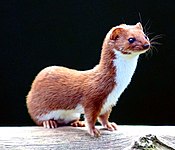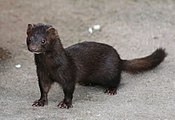Subfamily of carnivores
Mustelinae
American mink
Scientific classification
Kingdom:
Animalia
Phylum:
Chordata
Class:
Mammalia
Order:
Carnivora
Family:
Mustelidae
Subfamily:
Mustelinae G. Fischer de Waldheim , 1817
Genera
Mustelinae range
Mustelinae is a subfamily of family Mustelidae , which includes weasels , ferrets and minks .[1] [2]
It was formerly defined in a paraphyletic manner to also include wolverines , martens , and many other mustelids, to the exclusion of the otters (Lutrinae ).[3]
Extant species of Mustelinae [ ] Subfamily Mustelinae
Image
Genus
Living species
Mustela Linnaeus, 1758 (weasels, ferrets, European mink and stoats)
Mountain weasel , Mustela altaica Stoat or ermine, Mustela erminea Steppe polecat , Mustela eversmannii Domestic ferret , Mustela furo Haida ermine , Mustela haidarum Japanese weasel , Mustela itatsi Yellow-bellied weasel , Mustela kathiah European mink , Mustela lutreola Indonesian mountain weasel , Mustela lutreolina Black-footed ferret , Mustela nigripes Least weasel , Mustela nivalis Malayan weasel , Mustela nudipes European polecat , Mustela putorius American ermine , Mustela richardsonii Siberian weasel , Mustela sibirica Back-striped weasel , Mustela strigidorsa
Neogale Gray , 1865
The sea mink (Neogale macrodon ) is a recently extinct species from the 19th century that was native to the Maritime Provinces of Canada and New England in the United States .
Importance for humans [ ] Some of the fashion furs come from this subfamily: ermine, weasel, mink and polecat.[4]
Ferret model of COVID-19 [ ] COVID-19 can infect both the European mink (Mustela lutreola ) and the American mink (Neogale vison ). Ferrets are used to study COVID-19 .[5] [6] mink .[7] COVID-19 because mice lack the ACE2 gene.[5]
References [ ]
^ Nascimento, F. O. do (2014). "On the correct name for some subfamilies of Mustelidae (Mammalia, Carnivora)" . Papéis Avulsos de Zoologia (São Paulo) . 54 (21): 307–313. doi :10.1590/0031-1049.2014.54.21 ^ Law, C. J.; Slater, G. J.; Mehta, R. S. (2018-01-01). "Lineage Diversity and Size Disparity in Musteloidea: Testing Patterns of Adaptive Radiation Using Molecular and Fossil-Based Methods" . Systematic Biology . 67 (1): 127–144. doi :10.1093/sysbio/syx047 PMID 28472434 . ^ Koepfli KP, Deere KA, Slater GJ, et al. (2008). "Multigene phylogeny of the Mustelidae: Resolving relationships, tempo and biogeographic history of a mammalian adaptive radiation" . BMC Biol . 6 : 4–5. doi :10.1186/1741-7007-6-10 . PMC 2276185 PMID 18275614 . ^ "History of Fur in Fashion: Introduction" . 4 December 2011.^ a b Muñoz-Fontela, César; Dowling, William E.; Funnell, Simon G. P.; Gsell, Pierre-S.; Riveros-Balta, A. Ximena; Albrecht, Randy A.; Andersen, Hanne; Baric, Ralph S.; Carroll, Miles W.; Cavaleri, Marco; Qin, Chuan; Crozier, Ian; Dallmeier, Kai; de Waal, Leon; de Wit, Emmie; Delang, Leen; Dohm, Erik; Duprex, W. Paul ; Falzarano, Darryl; Finch, Courtney L.; Frieman, Matthew B.; Graham, Barney S.; Gralinski, Lisa E.; Guilfoyle, Kate; Haagmans, Bart L.; Hamilton, Geraldine A.; Hartman, Amy L.; Herfst, Sander; Kaptein, Suzanne J. F.; Klimstra, William B.; Knezevic, Ivana; Krause, Philip R.; Kuhn, Jens H.; Le Grand, Roger; Lewis, Mark G.; Liu, Wen-Chun; Maisonnasse, Pauline; McElroy, Anita K.; Munster, Vincent; Oreshkova, Nadia; Rasmussen, Angela L.; Rocha-Pereira, Joana; Rockx, Barry; Rodríguez, Estefanía; Rogers, Thomas F.; Salguero, Francisco J.; Schotsaert, Michael; Stittelaar, Koert J.; Thibaut, Hendrik Jan; Tseng, Chien-Te; Vergara-Alert, Júlia; Beer, Martin; Brasel, Trevor; Chan, Jasper F. W.; García-Sastre, Adolfo; Neyts, Johan; Perlman, Stanley; Reed, Douglas S.; Richt, Juergen A.; Roy, Chad J.; Segalés, Joaquim; Vasan, Seshadri S.; Henao-Restrepo, Ana María; Barouch, Dan H. (October 2020). "Animal models for COVID-19" . Nature . 586 (7830): 509–515. doi :10.1038/s41586-020-2787-6 ISSN 1476-4687 . PMC 8136862 PMID 32967005 . ^ "Table 1 SARS-CoV-2 infection in humans and in animal models" . Retrieved 14 November 2020 .^ Racaniello, Vincent; Despommier, Dickson; Dove, Alan; Condit, Rich; Barker, Brianne; Griffin, Daniel; Rosenfeld, Amy. "TWiV 679: Mink, mutation, and myocytes | This Week in Virology" . TWiV . Retrieved 14 November 2020 .
External links [ ]
Extant Carnivora species
Kingdom: Animalia
Phylum: Chordata
Class: Mammalia
Infraclass: Eutheria
Superorder: Laurasiatheria
Nandiniidae
Nandinia
African palm civet (N. binotata )
Herpestidae (Mongooses)
Hyaenidae (Hyenas)
Felidae Large family listed below
Viverridae Large family listed below
Eupleridae Small family listed below
Family Felidae
Felinae
Acinonyx Caracal Catopuma
Bay cat (C. badia ) Asian golden cat (C. temminckii ) Felis Herpailurus
Jaguarundi (H. yagouaroundi ) Leopardus Leptailurus Lynx
Canada lynx (L. canadensis ) Eurasian lynx (L. lynx ) Iberian lynx (L. pardinus ) Bobcat (L. rufus ) Otocolobus Pardofelis
Marbled cat (P. marmorata ) Prionailurus Puma
Pantherinae
Panthera
Lion (P. leo ) Jaguar (P. onca ) Leopard (P. pardus ) Tiger (P. tigris ) Snow leopard (P. uncia ) Neofelis
Sunda clouded leopard (N. diardi ) Clouded leopard (N. nebulosa )
Paradoxurinae
Arctictis Arctogalidia
Small-toothed palm civet (A. trivirgata ) Macrogalidia
Sulawesi palm civet (M. musschenbroekii ) Paguma
Masked palm civet (P. larvata ) Paradoxurus
Hemigalinae
Chrotogale Cynogale
Otter civet (C. bennettii ) Diplogale Hemigalus
Banded palm civet (H. derbyanus )
Prionodontinae (Asiatic linsangs)
Viverrinae
Civettictis
African civet (C. civetta ) Genetta (Genets) Poiana Viverra Viverricula
Small Indian civet (V. indica )
Suborder Caniformia (cont. below)
Ursidae (Bears)
Ailuropoda
Giant panda (A. melanoleuca ) Helarctos Melursus Tremarctos
Spectacled bear (T. ornatus ) Ursus
American black bear (U. americanus ) Brown bear (U. arctos ) Polar bear (U. maritimus ) Asian black bear (U. thibetanus )
Mephitidae (Skunks )
Conepatus (Hog-nosed Mephitis
Hooded skunk (M. macroura ) Striped skunk (M. mephitis ) Mydaus Spilogale (Spotted skunks)
Procyonidae (Raccoons, coatis, olingos)
Ailuridae
Ailurus
Himlayan red panda (A. fulgens ) Chinese red panda (A. styani )
Suborder Caniformia (cont. above)
Otariidae (Eared seals) (includes fur seals sea lions ) (Pinniped inclusive)
Arctocephalus Callorhinus
Northern fur seal (C. ursinus ) Eumetopias
Steller sea lion (E. jubatus ) Neophoca Otaria
South American sea lion (O. flavescens ) Phocarctos
New Zealand sea lion (P. hookeri ) Zalophus
Odobenidae (Pinniped inclusive)
Phocidae (Earless seals) (Pinniped inclusive)
Cystophora Erignathus
Bearded seal (E. barbatus ) Halichoerus Histriophoca
Ribbon seal (H. fasciata ) Hydrurga
Leopard seal (H. leptonyx ) Leptonychotes Lobodon
Crabeater seal (L. carcinophagus ) Mirounga (Elephant seals)
Northern elephant seal (M. angustirostris ) Southern elephant seal (M. leonina ) Monachus
Mediterranean monk seal (M. monachus ) Neomonachus Ommatophoca Pagophilus Phoca
Spotted seal (P. largha ) Harbor seal (P. vitulina ) Pusa
Canidae Large family listed below
Mustelidae Large family listed below
Family Canidae (includes dogs )
Family Mustelidae
Helictidinae (Ferret-badgers)
Guloninae (Martens and wolverines)
Ictonychinae (African polecats and grisons)
Lutrinae (Otters)
Melinae (Eurasian badgers)
Mellivorinae
Mellivora
Honey badger (M. capensis )
Mustelinae (Weasels and minks)
Mustela (Weasels and ferrets )
Mountain weasel (M. altaica ) Stoat/Beringian ermine (M. erminea ) Steppe polecat (M. eversmannii ) Ferret (M. furo ) Haida ermine (M. haidarum ) Japanese weasel (M. itatsi ) Yellow-bellied weasel (M. kathiah ) European mink (M. lutreola ) Indonesian mountain weasel (M. lutreolina ) Black-footed ferret (M. nigripes ) Least weasel (M. nivalis ) Malayan weasel (M. nudipes ) European polecat (M. putorius ) American ermine (M. richardsonii ) Siberian weasel (M. sibirica ) Back-striped weasel (M. strigidorsa ) Neogale
Taxidiinae
Taxidea
American badger (T. taxus )




